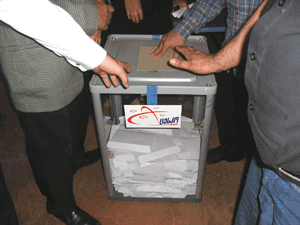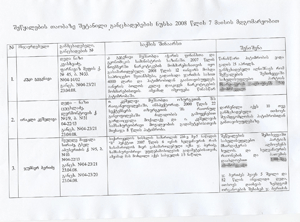Prisoners released in exchange for five hundred votes
 Maka Malakmadze, Batumi
Maka Malakmadze, Batumi
The information about prisoners, who were promised freedom if their relatives collected 500 votes, was widely distributed during the pre-election campaign. The validity of the information can be proved by the list the Human Rights Center received at the Election HQ of the National Movement, the ruling party.
Name of the person who provided the list will remain anonymous because of safety. The list of names, addresses, case content and remarks of convicted people has the following title: “List of Applications for Pardoning.”
The most interesting is the box of remarks where following texts are written: “He has to serve a sentence of four more years. The applicant states if he is pardoned, he will collect 500 votes in support of the ruling national party;” “residents of Firosmani and Era streets in Batumi will support the ruling party with 500 votes if a prisoner is pardoned;” “if he is pardoned, nearly 1000 voters will support the ruling party in Khulo and Khelvachauri districts.”
We introduced ourselves as members of the ruling party and checked several families that were mentioned in the list.
The woman who works in the shop in the suburb of Batumi was not surprised to see members of the National Movement. She believed when we inquired whether everything was ok and nothing was changed. “S.M. is my son-in-law. My daughter has just left. If you had come a bit earlier you might have met her. She met Teimuraz Charkviani (single mandate candidate in Batumi (from the National Movement); he promised to pardon her husband. We have already provided 500 ID numbers to him,” said the woman.
Another family gathered more votes in order for her son to be released from prison. “We collected 1,500 votes and provided them to the party. We are promised that he will be pardoned.”
The woman added how “we have kept our promise and hope that they will they keep theirs”
There are convicted people on the list whose marked boxes do not indicate the number of requested votes. The Human Rights Center visited other such families as well. “I met with the administration of the Election HQ and told what was situation. Dolidze from the HQ of the National Movement then was in contact us twice and said they had discussed the issue with the investigator and the prosecutor and then sent the information to a higher authority. We are waiting maybe they will assist us.”
The Human Rights Center could not meet with any of the pardoned prisoners at this time. However similar lists existed in other regions too.
Several residents of Kobuleti (their names are kept anonymous because of their security) reported that Mamuka Tsulukidze, a resident of Kobuleti was released. He had been locked up because of drug dealing.
Tariel Khalvashi is also free because of his ill health. He was sentenced to thirteen-year- termof imprisonment. He was arrested on May 8 2004. He was one of the famous faces in the team of Aslan Abashidze, former governor of Adjara Autonomous Republic. Reportedly, he is temporarily released from prison because his health.
Teimuraz Charkviani initially recognized the list and then but later he denied and asked:
-How did you get hold of this list? I thought it was another list.
-How do you thing where this list was drawn up?
-you should ask whoever completed the list. How could I promise somebody to release a prisoner; as I am a prosecutor of Georgia?
However, every respondent stated that they had personally met Teimuraz Charkviani. According to the Article 164 of the Criminal Code, drawing up the list of people requesting pardoning means bribing of voters.
List of Applications for Pardoning On May 7 2008
1. Kuka Gegenava, mother Nazi Kvaskhvadze, address: Farnavaz Mefe Street # 45 App. 33. # 04-14/02. Application # 04-23/21. 23/04/08
Gegenava worked at the Treasury of the Ministry of Economy and Finances of Adjara Autonomous Republic. In November of 2007 he was tried for being a drug-addict. On January 12 2008 he agreed to a plea-bargain deal; a fine of 4,000 GEL was and he was released. At the end of January of 2008 he was again arrested for drug use and is placed in pre-trial detention isolator cell.
Deadline for the pre-trial detention expires on April 15. The applicant stated that if he is pardoned 500 people will vote for the ruling party during the Parliamentary Elections.
2. Irakli Keshelava, mother Nazi Tsetskhladze. Address: Lermontovi Street # 1/9 App. # 31; 04-22/13. Application # 04-23/21. 23/04/08
Keshelava worked as an inspector at the Ozurgeti Police Department. On September 22 2000 a citizen died in the police station because of violence. Keshelava was charged for abusing his power; he was sentenced to eight-years in prison.
He has to serve ten more months; he has applied for a pardon
3. Jumber Beridze, wife-Makvala Siradze. Address: Tbel Abuseridze Street # 5 App. 10. # 04-22/13. Application # 04-23/21. 23.04.08 On June 6 2007 he was judged under the Article 214, Paragraph V-b of The Georgian Criminal Code for abusing his power. He has served 1/3 of his term.
If he is pardoned he will support the ruling party in Khulo and Khelvachauri Districts; he will collect nearly 1000 voters. J. Beridze has five children and eighty-two-year-old disabled mother. The family requests the corresponding bodies to pardon J. Beridze.
4. Iuri Diasamidze. Wife-Tamar Gogoberidze. Address: Era Street # 54/62. App.113. #04-22/14. Application # 04-23/21. 23.04.08
Diasamidze was charged under the Article 182, Paragraph II-d and Paragraph III-b of the Georgian Criminal Code on April 19 2007. He was sentenced to a term of eight years in prison.
Applicant requests to reduce the term or pardon I. Diasamidze.



